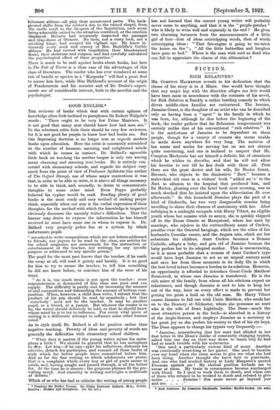GOOD ENGLISH.* Tin reviewer of books which deal with certain
spheres of knowledge often feels inclined to paraphrase Sir Robert Walpole's words : " There ought to be very few Prime Ministers. It is not good that many men should know how bad men are." So the reluctant critic feels there should be very few reviewers, for it is not good for people to know how bad books are. But this depressing doctrine is no longer true as regards modern books upon education. Here the critic is constantly astonished at the number of humane, amusing, and enlightened minds with which he cornea in contact. Dr. Ballard's agreeable little book on teaching the mother tongue is only one among many charming and amusing text-books. He is entirely con- cerned with elementary schools, and regards his subject very much from the point of view of Professor Aydelotte (the author of The Oxford Stamp), one of whose major contentions it was that, in order to be able to write, it is above all things necessary to be able to think, and, secondly, to desire to communicate thoughts to some other mind. Even Pepys probably believed his cypher would be read. Reading plenty of good books is the most ready and easy method of making people think, especially when our aim is the verbal expression of these thoughts, for the method with which the knowledge is imparted obviously decreases the unready writer's difficulties. That the learner may desire to express the information he has himself received he must have some one to whom to express it. Dr. Ballard very properly pokes fun at a system by which unfortunate pupils " are asked to write compositions which are not lettersaddressed to friends, nor papers to be read to the class, nor articles for the school magazine, nor memoranda for the instruction or entertainment of the teacher, nor writings for any specific purpose or addressed to any specific person."
The pupil for the most part knows that the teacher, if he reads the essay at all, will read it grimly and hastily. It is no good for him to try to amuse the teacher, to tell him something he did not ]mow before, or convince him of the error of his ways.
" As it is, too much strain is put upon tho teacher : more responsiveness is demanded of him than one poor soul can supply. The difficulty is partly met by increasing the amount of oral composition and diminishing the amount of written com- position. When, however, a child does write, I submit that the product of his pen should be read by somebody ; but that ' somebody ' need not be the teacher. It may be another pupil, or a friend, or a parent. But whoever the reader is to be, the writer should definitely be told, so that he should know whose mind he is to try to influence. For every vital piece of writing is a deliberate attempt to influence some other human mind.'
As to style itself, Dr. Ballard is all for positive rather than negative teaching. Poverty of ideas and poverty of words are generally the difficulties with elementary school children.
" What does it matter if the young writer mixes his meta- phors a little ? We should be grateful that he has metaphors to 'Aix. Let him—if he can—split his infinitives, dislocate his adverbs, detach his participles, and commit all those faults of style which far better people have committed before him. And as for the fine writing to which adolescents are prone, that is a complaint which every boy or girl of parts seems to catch, and, having caught and passed through, is all the better for. At the time he is sincere : the gorgeous phrases fit the pre- vailing mood. And sincerity in writing outweighs a multitude of defects."
Which of us who has had to criticize the writing of young people
• Tadehing the Mother Teague. By Philip Boxwood Ballard. ILA.. D.Litt. London : Hodder and Stoughton. [4s. 6d. net.]
has not learned that the correct young writer will probably never come to anything, and that it is the " purple-patcher " who is likely to write well and copiously in the end ? He gives two charming instances from the announcements of a little girl of four—first of ideas outstripping words, then of words outstripping ideas : " That fire-engine is going to un-catch the house on fire " ; " All the little butterflies and burglars have gone to bed." Where is the man with soul so dead who can fail to appreciate the oharm of this alliteration ?


































 Previous page
Previous page